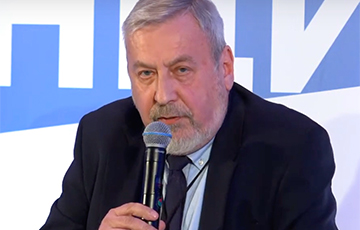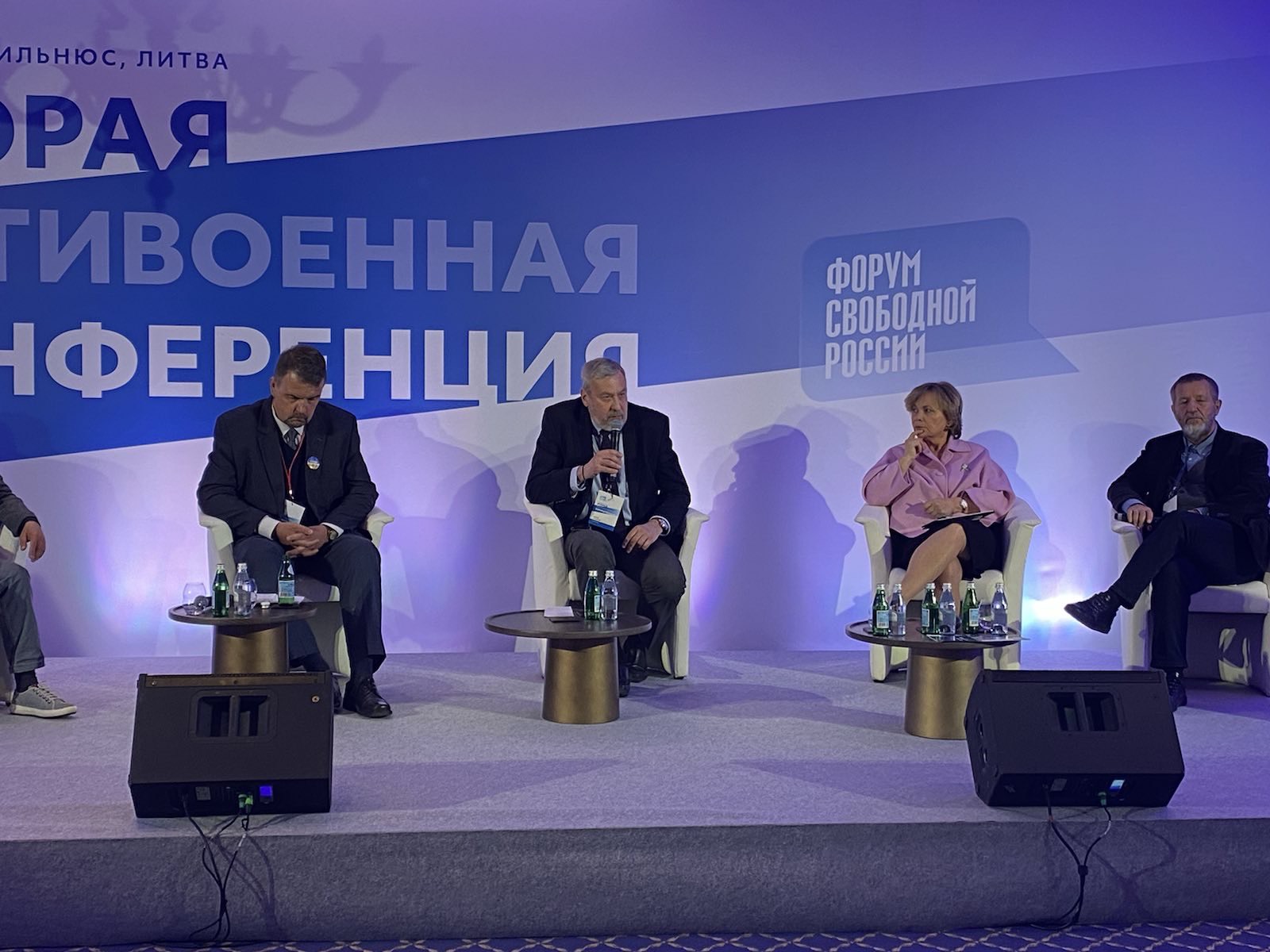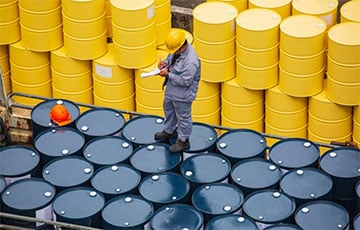Lukashenka's Dictatorship Shall Be Eliminated To Help Ukraine
17- Andrei Sannikov
- 23.05.2022, 13:22
- 15,338

Free European Belarus is a guarantee of the post-war existence of Europe.
Leader of the European Belarus civil campaign Andrei Sannikov declared this speaking at the second Anti-War Conference in Vilnius organized by the Free Russia Forum.
The Charter97.org website provides the text of the opposition politician's speech.
Europe after the war
The war in Ukraine has led to the most serious systemic crisis in all the years of the existence of European institutions.
This crisis will not end after the war and could result in disastrous consequences for Europe.
The war completely changed pictures of politics, security, economics and social processes in Europe. This happened not because of the Russian aggression, but because of the heroism of the Ukrainians, who were about to be written off, and now they show miracles of courage and self-sacrifice, defending the basic European values.
The emerging new picture of the world order requires a new core by which we're rethinking everything we're doing. It will require not just a change in agenda, but a complete replacement of the very core of international relations.
This situation is not looking good in the West in general and particularly in Europe. First of all, because of the different approaches to the Russian factor and, accordingly, the different policies towards Russia.
Major Western policy mistakes
The gentle attitude towards the Russian factor and the self-indulgence of the West led to the situation when Russian aggression became a surprise every time.
An erroneous attitude towards modern history appeared from the very collapse of the USSR.
It was as follows:
— De facto recognition of Russia's spheres of influence in the territories of the former USSR. The West immediately accepted Russia's succession and recognized the term "near abroad".
— Building a relationship policy with the countries of the former "socialist camp" according to the principle that "Russia is first of all". This means that Russia's interests were in the first place, and the newly independent states were considered through the Kremlin.
— Refusal to create an energy security system in Europe and increasing dependence on Russian energy supplies. Green energy was the priority at a time when there were neither technological nor political prerequisites for this.
— Support for democratic institutions has been relegated to second place, and the focus has been on a market-based approach that will allegedly change the Kremlin's policy. This allowed Russia to use market mechanisms to reinforce autarchy and undermine Western values in the West itself.
— Ignoring the reasonable concerns of the countries of Eastern and Central Europe regarding the threat of Russia to international peace and security.

Europe's future is in serious doubt
There is simply no objective analysis of what is happening in Russia and other post-Soviet states. The number of strategic, analytical centers and different foundations increased significantly after the collapse of the USSR, but the quality of analysis in our region had been steadily declining.
One of the reasons is the noticeable influence of pro-Kremlin experts and supporters of the “appeasement” policy towards dictators on Western centers.
And furthermore, the number of large foundations that are not only engaged in research, but also allocate large sums to development projects in our region has also increased. The only trouble is that support is provided in those areas that the staff of these funds consider promising. Using the example of Belarus, we can say that often the qualifications of experts from these funds leave much to be desired because the funds of Western taxpayers go to support frankly pro-government projects, dependent media, and lobbyists of the dictatorial regime.
Giving arguments is not a hard task in this case. It is enough to look at the reassuring reports of such foundations, both American and European, and compare them with the real situation in the dictatorship.
What, for example, public opinion polls can be discussed in the situation of insane repressions in Belarus? However, Chatham House, the once-respected British analytical center, is putting its name under fraudulent polls claiming continued support for the dictator and approval of Russia's war against Ukraine.
We all remember the withdrawal of the West from Afghanistan. It was a terrible sight: Afghans who worked in organizations created or controlled by the West, falling from overcrowded planes.
It was a terrible and clear picture of the complete failure of Western policy in non-democratic states, the exposure of huge corruption, the substitution of values for commercialism, complete ignorance, misunderstanding and unwillingness to understand the local realities, characteristics and value system of the society.
Huge amounts of money have been invested in Afghanistan, not only for strengthening security but also for governance and development, the creation of state institutions, and the development of civil society and non-governmental organizations. In other words, officially the investments were intended to prevent the course of events that actually caused the situation.
It was clear that the money was simply divided, passed through corruption schemes, and settled in the pockets of public organizations controlled by corrupt structures.
Afghan politicians and public figures said that 80% or even 90% of the invested money was wasted.
This particular model that operates in our region is cynically called "promoting development, democracy and the protection of human rights".
The high-profile projects of the European Union, which in words are also aimed at helping democracy and development, but in fact leading to the opposite results, do not give confidence in the future of post-war Europe. We are speaking about the Eastern Partnership program.
The very appearance of this program a year after the annexation by Russia of the territories of Georgia was a kind of recognition of the illegal occupation. The program was poorly planned and financially unsecured. Moreover, it was clear that Russia would perceive it as a provocation and would definitely take revenge. Thus it happened. As of today, wars have been unleashed between Armenia and Azerbaijan during the existence of this program, Russia has been waging war in Ukraine for more than 8 years, psychopath Lukashenka, who is involved in the war against Ukraine, has strengthened his dictatorial regime in Belarus, and Moldova may become the next object of Russian aggression.
Belarus as a touch-stone
Belarus is very important for assessing Europe's security policy, democracy and human rights.
Belarus is the key to the entire region, it is in Belarus that the very rotten egg is located, in which the death of the dictatorship in the post-Soviet space is hidden.
Whether you like it or not, it was the Lukashenka regime that created the matrix that Putin uses today.
Even now, when the West is finally talking about the danger of Russia, about the fallacy of appeasing dictators, about unconditional support for Ukraine, again there are politicians, journalists and businessmen who are ready to save Lukashenka out of self-interest.
I can say for sure that if, after Ukraine defeats Russia, the West helps Lukashenka stay in power, very soon the disgusting body of the dictatorship in Russia and Belarus will gain weight again and start a war in Europe.
Therefore, if you want to help Ukraine win, you need to get rid of dictatorships, primarily Lukashenka's one.
The key to the post-war existence of Europe is not only an integral European Ukraine, but also a free European Belarus.
What to expect from Russia?
The war in Ukraine has exacerbated all the security problems for Europe.
First of all, it is necessary to change the principles of decision-making. The Baltic states, Poland, Ukraine, the Belarusian opposition, and then free Belarus should be given priority in assessing risks and military security instead of the all-knowing "core" Europe. To be exact, they have been warning about the danger of Russia and the resurgent authoritarian tendencies in it for 30 years after the collapse of the USSR.
Will Russia be able to change in the near future?
No.
After any defeat, Russia made the only conclusion - revenge.
It is important to remember that Russia has always used a respite to prepare for a new conflict, and new wars after any period of turbulence, after wars or the "prison of nations" collapse. In a relatively peaceful period, the Kremlin invested heavily in the army and weapons, in special services, and in intelligence. With the advent of hybrid forms of confrontation, Russian leadership began to pour huge amounts of money into a cybersphere.
The West has been one of the main sources for the rearmament and reorganization of the armed forces and intelligence services, with technological supplies and even financial resources, offering cooperation programs in sensitive areas.
Russia does not need a normal existence, all its rulers suffer from the same disease: the delusions of exclusivity.
Russia narrowed down to the Kadyrov scale, this kind of illiterate "academician" and "tik-tok general" who demands to be praised endlessly and just as constantly apologized to him if he is not praised enough.
It is impossible to build any predictable relations with Russia in the near future. And not in the near future either.
At the same time, Russia will remain a center of power and a center of influence, most likely negative, for Europe and will not leave Europe. To be honest, it is desirable to make the borders straight and join Belarus, which is a natural part of Europe.
Conclusions
Thus, Europe needs to abandon those ties with Russia, which, in fact, were the essence of the entire Eastern policy of the European Union, in order to take into account the new realities and consolidate the positive experience that appeared during Russia's war of conquest against Ukraine.
The main principles of the renewal of Europe should be the following:
— Rejection of the idea that the security of Europe is impossible without Russia. On the contrary, it is impossible with the participation of Russia.
— Rejection of the recognition of any Russian spheres of influence outside its borders.
— Rejection of the policy of dependence on Russian energy supplies.
— Rejection of the "realpolitik" and any form of appeasement of dictatorships.
Europe as a union of democratic states has a future only in this case and under these conditions.











